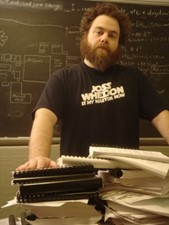Patrick Rothfuss
The Name of the Wind
Interview by Ed Robertson

Patrick Rothfuss is the author of the bestselling Kingkiller Chronicles, as well as other stories. He is the founder of Worldbuilders International, a charity that benefits various causes while promoting good deeds and geek culture. He is also the co-creator of the board game Tak.
Ed Robertson: Kvothe often contrasts his life story to the way things work in fables or myths. Was this to help ground the fantasy elements of the novel?
Patrick Rothfuss: Hmmmm..... I might have to pass on this question. I can't think of anything interesting to say. It's a good question, it's just really, really big.
Ed: Take the "dragons" in the story. What led you to get into them as flesh-and-blood animals rather than a more conventional monster?
Patrick Rothfuss: What would an animal be made of if not flesh and blood? Pixie dust and happy thoughts? No thanks. I prefer something with a circulatory system. Honestly, I think a better question would be to ask other writers why they insist on asking us to believe implausible stories about huge flying lizards that violate the square cube law and seem to have a Freudian fixation on princesses. You know how people divide science fiction into two camps: hard and soft? Hard sci-fi is where everything is backed by actual math. The science is sound. Soft sci-fi is just a lot of handwaving and technical-sounding terms that don't mean anything. I divide fantasy into the same two groups: hard and soft. Hard fantasy is realistic. The worlds feel stable, solid, and internally consistent. Tolkien, Feist, Gaiman, and Pratchett are good at this. Pullman, Powers, and McCaffrey, too. While all their worlds are different, they are cohesive and make sense within themselves. Soft fantasy worlds have a much looser cause-and-effect relationship. Alchemists can turn lead into gold and nobody wonders about how it will impact the currency system. Someone waves a wand and turns an elephant into a mouse and nobody worries about conservation of mass. And you can drop a ten ton flying carnivore into an ecosystem and not be bothered with how, exactly it manages to survive while eating only princesses. Don't get me wrong, hard and soft fantasy stories can both be good. But you need to know which camp you're in. I'm into realism. I'm a hard fantasy guy.
Ed: Did you work out Kvothe's real story first, or the legends around him?
Patrick Rothfuss: A little of both, actually. Sometimes the legend came first, sometimes the real adventure. Sometimes they developed hand-in-hand. It's kinda like the chicken-and-the-egg thing. Except that isn't really a good analogy, as neither chickens or eggs have hands.... Alright. I've stopped making sense. Next question.
Ed: Did your years at UWSP (University of Wisconsin, Stevens Point) give you the background for all the period detail? Was there much research involved?
Patrick Rothfuss: Yeah. I took classes about feudal Japan and Greek philosophy. I studied ancient warfare and anthropology and early goddess religions. I read up on Sumerian mythology and bunraku puppet theatre and psychopharmacology. I loved college. I wish I was still taking classes instead of teaching them. I think the best part of being an author is that I get to learn about anything I want and explain it away as research. I want to learn how to pick locks, swordfight, throw pottery – it's all research. It's like the curious person's version of James Bond's license to kill. I've got a license to learn.
Ed: Once you've found out how something happened or worked in the real world, do you feel at all bound for your world to follow that? How much room for invention is there?
Patrick Rothfuss: I don't feel beholden to follow the real world at all. The important thing is to know WHY things turned out the way they did. You need to understand the reasons for events, or at least be able to make reasonable guesses about them. Take something like the black death. If my world is struck with a horrible plague that kills a third of the population, will it lead to the same social and economic change that Europe experienced? No. Of course not. But knowing the changes Europe went through will help me make good choices when I decide what path history takes in my world.
Ed: Your blog mentions you'd finished the first draft of the Kingkiller Chronicles in 1999. What was the time between then and The Name of the Wind's publication like?
Patrick Rothfuss: Parts of it were really frustrating. The two years of rejection were frustrating because I knew I wasn't making any headway at all. I was just sucking at writing a query letter. Later, after I finally hooked up with my agent, things were frustrating on a different level. I needed to learn new things about writing. I needed to know how to perform on demand.
Ed: As a teenager, Kvothe bounces between moments of shining confidence and overwhelmed failure, something that's familiar to anyone who remembers those years. What are the difficulties of writing about a kid without sounding like an adult trying to sound like a kid?
Patrick Rothfuss:That's really the writer's ultimate dilemma. How do I write a female character without sounding like a guy trying to sound like a woman? How do I write from the perspective of a musician, or a magician, or a racist, or a poet without it coming across as tissue thin and artificial? Compared to some of the above, writing from a teen's perspective is easy as pie. At least I've actually been a teen. I've never been a woman, or an ethnic minority, or a weary old man. If anything, writing from the perspective of a child is probably easier for me. When I was a kid everyone thought I was so clever and precocious. Now that I'm adult, everyone thinks that I'm kinda odd and childish. I don't know if this means that I'm regressing, or if I've always been about sixteen years old in my head and I'm holding steady at that mental altitude.
Ed: Everyone's been a teen, but the list of artists who really get them is practically limited to JD Salinger and Judd Apatow. It's kind of intense but flighty – how do you capture that without trivializing the age? You sound naturally curious; do you think that jibes with the way they can pick up an interest, absorb it, then move right along to the next one?
Patrick Rothfuss: That's a possibility, I suppose. But again, that implies that I'm able to write like a teen because I think like a teen. I hope I'm not trapped like that. A real writer has to be more versatile. I believe a writer's most important skill lies in being able to see things from different perspectives. Not just the shallow stuff. I'm not talking about walking a mile in some guy's shoes. I'm talking about getting in behind his eyes, riding around in his head, wearing his skin. How did he sleep last night? Are his eyes scratchy? What does the inside of his mouth taste like? Is he afraid of the dark? When was the last time someone gave him a hug? If you're really sunk down deep into a character, you know these things. Or at the very least you can make good guesses. Sometimes when I get up after writing, I'm surprised at how my body feels. Suddenly I'm not a lanky, hungry young boy any more. It's no fun putting on ten years and fifty pounds all of a sudden. Other times, I get up and I'm pleasantly surprised that I'm not a weary innkeeper, hopeless, with bones that feel like they're made of lead. I really sink into the characters that I write. Settings, too. Sometimes I go outside after a long stretch of writing and I'm surprised it's not raining. Or that it's daylight. Or that it's not the middle of winter. I don't know if that level of immersion is normal, but it's now I do things. I like it. It works well for me.
Ed: For all the tragedy of the book, there's an equal amount of humor, which is rare in epics. Is that something you try to focus on?
Patrick Rothfuss: I don't focus on it specifically, but I don't skirt away either. Humor is important. If you're going to tell any sort of realistic story, you're going to have to have humor in it, because people are funny. Clever people especially. If you're going to have a book full of clever people and nobody ever jokes, it's just not going to ring true to the reader. That said, humor writing is the hardest kind of writing there is. I say this as someone who's written a humor column for the local paper for over a decade. Humor is hard, hard, hard. And if you fail with humor, you don't fail halfway. You drop the ball humor-wise and everyone notices. The other thing humor is important for is pacing. If your whole book is just drama drama drama, it's going to wear down the reader. You also run the risk of getting melodramatic and pretentious. We need time to relax and enjoy ourselves too, no matter how dark the story. The occasional humorous moment helps with that. That's one of the things that Joss Whedon excels at in his storytelling.
Ed: Any significance to the English spelling of "grey" in the book?
Patrick Rothfuss: I just like it better. Grey spelled with an "a" looks weird to me. It looks wrong.
Ed: You've said there will be more books in this world after the original trilogy's printed. Is your current interest mainly in writing fantasy?
Patrick Rothfuss: Yeah. That's where my heart lies. It's what I grew up reading and it's what I like reading these days too. That said, I might go somewhere else for a vacation someday. Maybe explore the different corners of the genre. This series is heroic/epic fantasy, but I think I could have fun writing a humorous urban fantasy. I have an idea for a modern-day faerie tale too. A lot will depend a lot on how I'm feeling as I finish up the trilogy.
Ed: Talking about genre can be tricky – it's almost unfair to shoehorn The Name of the Wind into one category – but what is it that draws you to fantasy?
Patrick Rothfuss: It's a genre that allows me to create anything I want. That, in turn, allows me to explore any sort of idea I'm curious about. I love it because Fantasy is a genre that asks, "What if...?" That's my favorite question.
You can learn more about Patrick Rothfuss at patrickrothfuss.com
Interview conducted by email, June of 2007
Copyright © 2007 Adventures Underground
More Interviews
